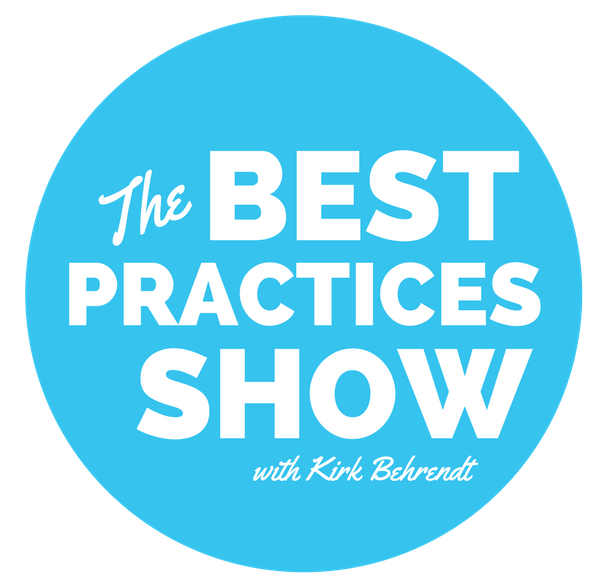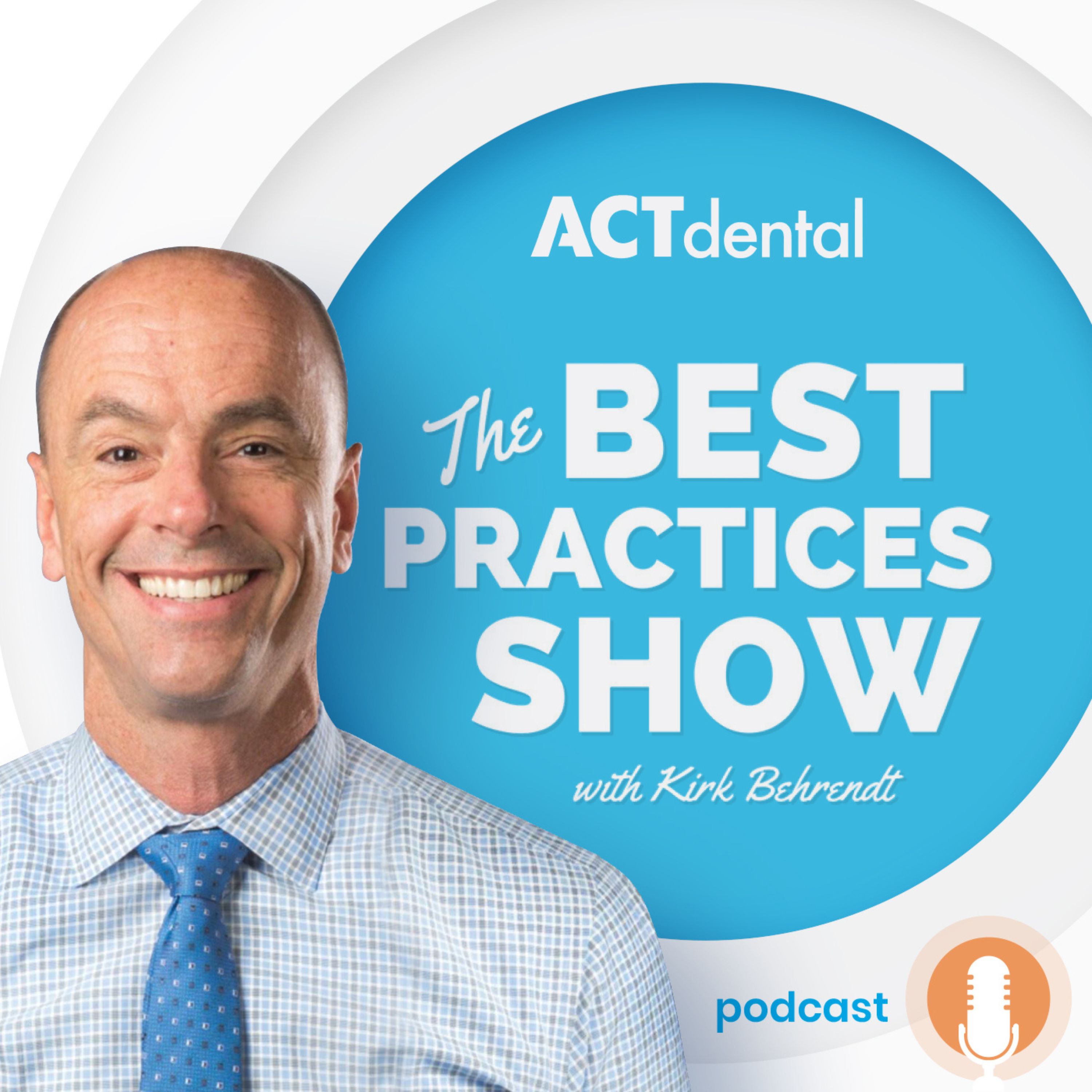Episode 529
529: Why Trust Requires Rules in Your Practice - Heather Crockett
529: Why Trust Requires Rules in Your Practice - Heather Crockett
Without trust, you don't have a team. Building that trust is hard work, and Kirk Behrendt brings back Heather Crockett, one of ACT’s amazing coaches, to share tips and advice for getting started. Before anything else, you need to establish some rules! Once you do, everything else will become a lot easier. To learn why you need rules to build trust as a leader, listen to Episode 529 of The Best Practices Show!
Episode Resources:
- Heather’s email: heather@actdental.com
- Heather’s Facebook: https://www.facebook.com/heather.r.crockett
- Heather’s social media: @actdental
- Subscribe to the Best Practices Show Podcast
- Join ACT’s To The Top Study Club
- Join ACT’s Master Class
- See our Live Events Schedule here
- Get the Best Practices Magazine for Free!
- Write a Review on iTunes
Links Mentioned in This Episode:
Books by Patrick Lencioni: https://www.tablegroup.com/books
Traction by Gino Wickman: https://benbellabooks.com/shop/traction
Brené Brown: https://brenebrown.com
How Should a Company Share Its Values? | Q+A by Simon Sinek: https://www.youtube.com/watch?v=5yE541BY-1c
Books by Simon Sinek: https://simonsinek.com/books
DiSC: https://www.thediscpersonalitytest.com
Main Takeaways:
Everyone needs a good set of rules.
Building trust with your team requires hard work.
Understand predictive trust versus vulnerability-based trust.
Once you establish rules, you will attract people who like those rules.
If you're having a hard time establishing rules, hire a coach to help you.
Quotes:
“The issue is trusting one another on a deeper level than just predictive trust. Predictive trust, when we delineate between predictive trust and a different kind of trust that’s a vulnerability-based trust, our predictive trust is, I know that my husband is going to take the trash out because he’s so great at doing that every Friday morning before the trash guy comes. I know that Chris is going to show up to my meeting on time because that's who she is. She’s going to show up on time, every single time. Those are predictive-based trust type of behaviors. What we are going to dive into today, we’re going to talk about vulnerability-based trust and what that looks like.” (2:20—3:05) -Heather
“Vulnerability-based trust is the ability to open up and be honest with one another on a team to say, ‘Hey, I made a mistake. I did something wrong. I need your help. I'm stuck. I'm still learning.’ So, it’s taking the ego out of it and using our out-loud voices, bringing our ideas and our thoughts and our opinions to the table and putting it out there and saying it out loud, being honest with one another in a timely fashion.” (3:15—3:46) -Heather
“Vulnerability-based trust requires rules in your family, in your business. And one of the rules is you've got to have rules around behaviors — and that is core values.” (6:11—6:20) -Kirk
“I was at ADA SmileCon, and Brené Brown spoke. It’s one of the best lectures I've ever heard. I was moved. I was riveted. She said to a room of thousands of people, ‘Y'all got to have a set of rules. How many of you have a set of rules called values?’ And I was shocked by the number of hands that went up. There were so few hands, it was frightening. And she said, ‘You've got to have some rules, some behaviors.’ And what I didn't do as a leader is I didn't have a set of rules and behaviors.” (6:23—6:56) -Kirk
“Simon Sinek did a short speech on why values should be written. It’s fantastic. He says values are verbs. You should never have “trust” or something like that as a value because values have to be actionable.” (7:06—7:21) -Kirk
“It goes back to our favorite equation of E - R = C. I can't trust you and know that you are going to behave a certain way, especially around the verbs of the core values, until we have those core values set in place. Especially as we put together our strategy and our process as laid out in Traction as well. So, as the leader of the business, you need to have those things set in place before you can start embarking on the pathway of that vulnerability-based trust. We need to have these rules in place. We need to agree that, ‘This is how we’re going to behave in our meetings. This is what we’re going to do in our meeting. These are the behaviors that we’re going to embody on a weekly, daily, hourly basis, our core values. This is really what is expected.’ And once we lay that foundation, then we can start moving into the vulnerability-based trust concept.” (8:14—9:13) -Heather
“How this applies to your dental practice is this: if you're listening and you follow Lencioni’s work, and you know how important trust is in a business, my encouragement is to start with rules. And if you can't establish rules, that’s why you hire a coach.” (10:53—11:09) -Kirk
“It takes some time, but once you start establishing the rules, you start living by the rules. You start attracting other people that like the behaviors like core values. They go, ‘This is awesome! This is why I work here.’” (11:42—11:51) -Kirk
“Accountability happens with accounting. Accountability is not saying, ‘Hey, I trust you.’ No. We agreed that this is going to happen in seven days, and it happens the way you agreed.” (12:24—12:35) -Kirk
“We use the DiSC assessment. So, people take their quick DiSC assessment and they figure out if they're a D, I, S, or C. And our S’s — and there are a lot of S’s in dentistry because S’s are steadiness. They're nurturing, they're naturally humble, they're genuine and authentic, and they're very caring — very caring to the point that, oftentimes, they have something to say, and they choose not to say it because they want to spare the other person or other people their feelings. They don't want to rock the boat. They don't want to create or cause any conflict. They don't want to hurt anyone’s feelings — which is admirable, to a degree. The problem is, oftentimes, when we don't share out loud some of our thoughts, feelings, and opinions — notice, I said some. Some of our thoughts, feelings, and opinions, because sometimes we can overshare — the problem is, especially as we are talking as a team and we don't share those ideas and thoughts, we are actually doing the team more harm than we are if we’re quiet. So, if we stay quiet, we’re doing the team more harm than if we shared that idea and that thought in the first place.” (13:04—14:18) -Heather
“Not having the right people in the right seats, that's probably the toughest one of all time. Like, ‘Okay, we’re going to do this.’ Well, the person who’s going to do this really isn't the person that should be doing this. And so, if you can't make these decisions, you know they're holding you back. And they're holding you back in a big way.” (14:43—15:02) -Kirk
“One of the things is not calling out the truth. And when you can step into rules, you have behaviors, you’ve got the right people in the right seats, you can start to go to the second layer of the pyramid, which is conflict. Lencioni’s whole thing of starting with trust and then getting to conflict, you can't get to conflict unless you have trust.” (15:46—16:06) -Kirk
“As we work our way up the pyramid and we have that accountability piece, that peer-to-peer accountability gets much easier when we trust each other. When it comes from a place of, I'm not saying anything because I need Kirk to share a login with me and I'm afraid that Kirk’s going to say he can't get that done for me, or I don't want to rock the boat, I don't want to hurt his feelings like, ‘I can't believe you haven't done that for me. I've asked you to do it a couple of times for weeks,’ whatever it is, coming from a place of understanding, that we’re doing this for the betterment of the entire team, and there are no personal attacks attached to it. And I think that's one of the biggest hurdles for a lot of these team members to get over.” (16:50—17:32) -Heather
“Everybody wants the results, but nobody wants to do the hard work that gains the results.” (18:21—18:26) -Kirk
“There are three selves: the self you want to be, who others think you are, and who you really are. And there's the lowest amount of stress or energy when all of those three get as close as possible.” (19:47—20:05) -Kirk
“Work doesn't have to be a four-letter word. It can be a fun word.” (20:53—20:56) -Kirk
“We always say as goes the leader, so goes the team. So, the leader has to go first. And you can bring it and be transparent. Once you introduce this concept to your team, you, as the leader, need to go first and lead by example to say, ‘Okay, guys. Spoiler alert, I'm about to be vulnerable. I screwed this up. I made a mistake and I need your help.’ And that's okay.” (21:13—21:38) -Heather
“Patrick Lencioni talks a lot about, ‘Don't let them see you sweat.’ Why would we do that? Why would we not want our team to see us sweat? It’s really okay for them to see that we’re struggling with something.” (21:38—21:53) -Heather
“All change processes start with the first step, which is telling the truth, which can include being vulnerable.” (23:14—23:23) -Kirk
“We can, as leaders, have a mixture of that humility and the confidence. That's what really makes an amazing leader. Not only do they have that humility, but they also come in with a confident front as well. And they're developing other leaders in that same way. So, let them see you sweat in the way that you are, in fact, telling the truth and being honest.” (24:36—25:00) -Heather
“Get over yourself and be first. Go first. Be vulnerable with your team. Find that level, that in-between area, of where you need to be vulnerable and where you need to be confident.” (27:49—28:00) -Heather
Snippets:
0:00 Introduction.
1:45 Why this is an important topic.
3:05 Vulnerability-based trust, defined.
3:47 Kirk’s journey.
8:00 The importance of having rules in place.
9:14 Having rules lead to trust.
10:56 How this applies to a dental practice.
12:50 Roadblocks of having vulnerability-based trust.
18:01 Results require hard work.
21:02 Let them see you sweat a little.
23:09 Change starts with telling the truth.
24:11 Embrace the rules first.
27:33 Last thoughts.
Heather Crockett Bio:
Heather Crockett is a Lead Practice Coach who finds joy in not only improving practices but improving the lives of those she coaches as well. With over 20 years of combined experience in assisting, office management, and clinical dental hygiene, her awareness supports many aspects of the practice setting.
Heather received her dental hygiene degree from the Utah College of Dental Hygiene in 2008. Networking in the dental community comes easy to her, and she loves to connect with like-minded colleagues on social media. Heather enjoys both attending and presenting continuing education to expand her knowledge and learn from her friends and colleagues.
She enjoys hanging out with her husband, three sons, and their dog, Moki, scrolling through social media, watching football, and traveling.


